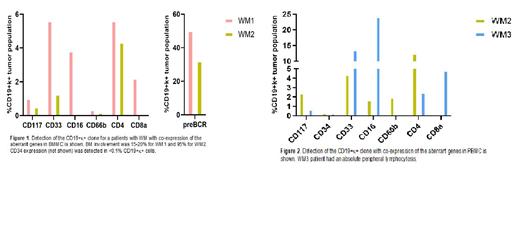Background: Our RNA-Seq analysis of 249 untreated MYD88 mutated WM patients showed aberrant expression of stem cell, pre-B-cell, T-cell and myeloid genes in early WM B clones. This expression pattern was associated with inferior progression free survival with BTK inhibitor therapy and diminished with advancing disease. We therefore sought to validate this early signature at the protein level using flow cytometry and evaluate its potential as a clinical assay to monitor WM disease evolution.
Methods: RNA-Seq predictions were validated on an independent cohort of treatment naïve MYD88 mutated WM patients and healthy (HD) samples. We designed a 13-color panel for flow cytometry detection of surface markers CD19, CD138, k and l immunoglobulin (Ig) light chains, CD34, CD117 (KIT), CD4, CD8A, CD33, FCGR3A (CD16), CEACAM8 (CD66b), pre-BCR (using an antibody that recognizes a unique conformational epitope of the BCR complex formed by the association of IGLL1 and VPREB1); Zombie Yellow was used to label dead cells. Peripheral B (PBMC) and/or BM mononuclear cells (BMMC) were isolated from WM and HD samples by density gradient centrifugation using Ficoll-Paque medium. Data acquisition was performed for at least 10^6 nucleated cells per tube in BDLSR Fortessa flow cytometer using the FACSDiva software.
Results: RNA-Seq analysis showed high expression of genes atypical of mature B-cells that significantly diminished with increasing disease burden. For validation purposes, we selected genes reaching at least a 10-fold drop in their expression levels between the earliest and the most advanced disease cohort. In particular, the T-cell and myeloid genes including CD4, CD8A, FCGR3A, CD33, CEACAM8 as well as the prePCR surrogate light chain genes IGLL1 and VREPB1 respectively decreased from 67.6, 7.1, 80.5, 23.2, 8.3, 114, 38.3 to 2.4, 0.9, 1.7, 0.7, 0.4, 12.2 and 4.3 transcripts per million (TpM). A subclonal stem cell signature was detected, including CD34 and KIT, which dropped from 1.67 and 0.64 to 0.15 and 0.06 TpM, respectively. It is well established that WM represents a mature, post germinal center clone. Consistent with this notion, expression of memory B-cell and plasma blast genes in our RNASeq data set, including PRDM1, XBP1 and SPIB, was high in all patients regardless of disease progression and expression of the studied atypical genes. Our independent patient validation cohort had a median age of 68 (range 50-88 years), BM involvement by immunohistochemistry of 40% (range 10-95%), hemoglobin of 13.2 (range 8.1-13.4 g/dL) and serum IgM of 686 (range 536-1,151 mg/dL). An IgMk monoclonal spike was detected in all cases. All patients were mutated for MYD88. Within the CD19+k+-selected cells, we detected a subpopulation of cells co-expressing CD34, KIT, CD4, CD8A, FCGR3A, CD33, CEACAM8 and preBCR in all the patients, including in PBMC. As predicted, these markers were relatively enriched in samples with lower BM disease burden ( Figure 1, 2). Even in those with the highest BM involvement, the subclone was still detectable in both cellular compartments. Conversely, HD controls showed normal B cell populations and no evidence of the aberrant subclone.
Conclusions: In WM primary cells, we observed the existence of a clonal B cell population that appears to re-activate stem cell programming early on and progressively is replaced by clones bearing more typical B cell markers with disease expansion. This study lays the foundation to develop a widely accessible methodology to accurately diagnose IgM MGUS/early-stage WM and monitor disease evolution. Flow-based sorting of these subclones will allow targeted multi-omic studies with insights into disease pathogenesis and targeted therapeutic applications.
Disclosures
Anderson:Pfizer, Janssen, Astrazeneca, Daewoong, Amgen, Starton, OncoPep, Precision Biosciences, Window Therapeutics, Mana Therapeutics: Membership on an entity's Board of Directors or advisory committees; Window, Starton: Current equity holder in private company, Current holder of stock options in a privately-held company, Membership on an entity's Board of Directors or advisory committees; Dynamic Cell Therapies: Current equity holder in private company, Current holder of stock options in a privately-held company, Membership on an entity's Board of Directors or advisory committees; NextRNA: Current equity holder in private company; Oncopep: Current equity holder in private company, Current holder of stock options in a privately-held company; C4 Therapeutics, Raqia, NextRNA,Dynamic Cell Therapy: Current equity holder in publicly-traded company, Current holder of stock options in a privately-held company, Membership on an entity's Board of Directors or advisory committees. Sarosiek:ADC Therapeutics: Research Funding; Beigene: Honoraria, Research Funding; Cellectar: Consultancy, Research Funding. Castillo:AstraZeneca: Consultancy, Research Funding; Abbvie: Consultancy, Research Funding; BeiGene: Consultancy, Research Funding; Cellectar: Consultancy, Research Funding; Loxo: Consultancy, Research Funding; Pharmacyclics: Consultancy, Research Funding; Kite: Consultancy; Mustang Bio: Consultancy. Treon:Bristoll Myers Squibb: Consultancy, Research Funding; Eli Lilly: Consultancy, Research Funding; BeiGene: Consultancy, Research Funding; Janssen: Consultancy, Research Funding; Abbvie/Pharmacyclics: Consultancy, Research Funding.


This feature is available to Subscribers Only
Sign In or Create an Account Close Modal